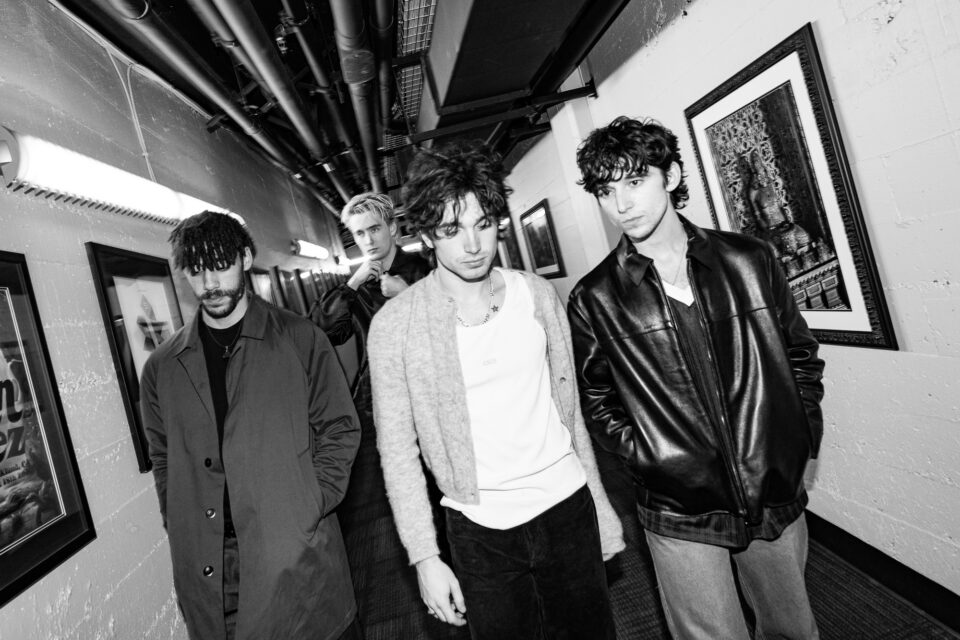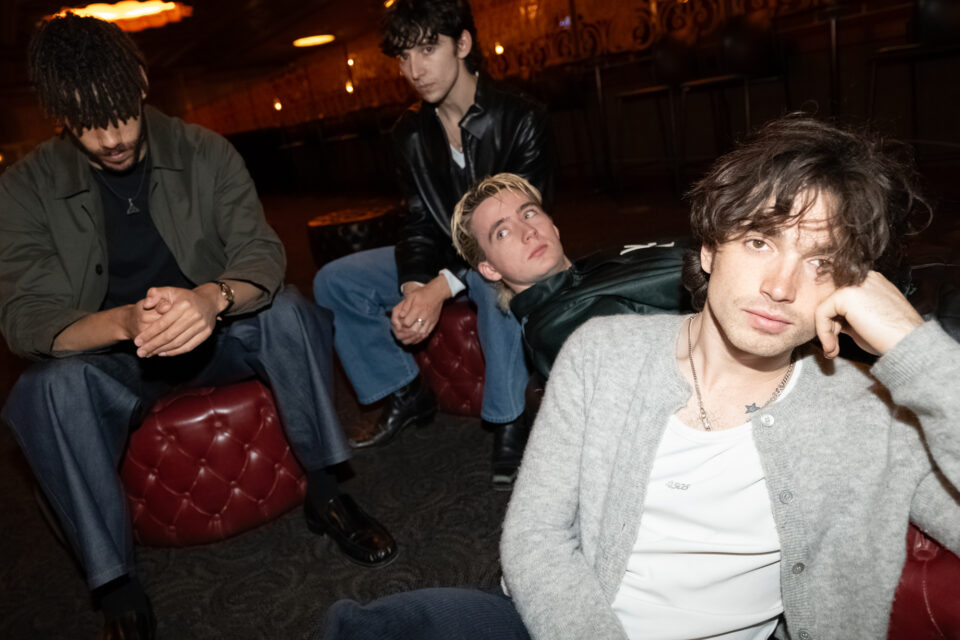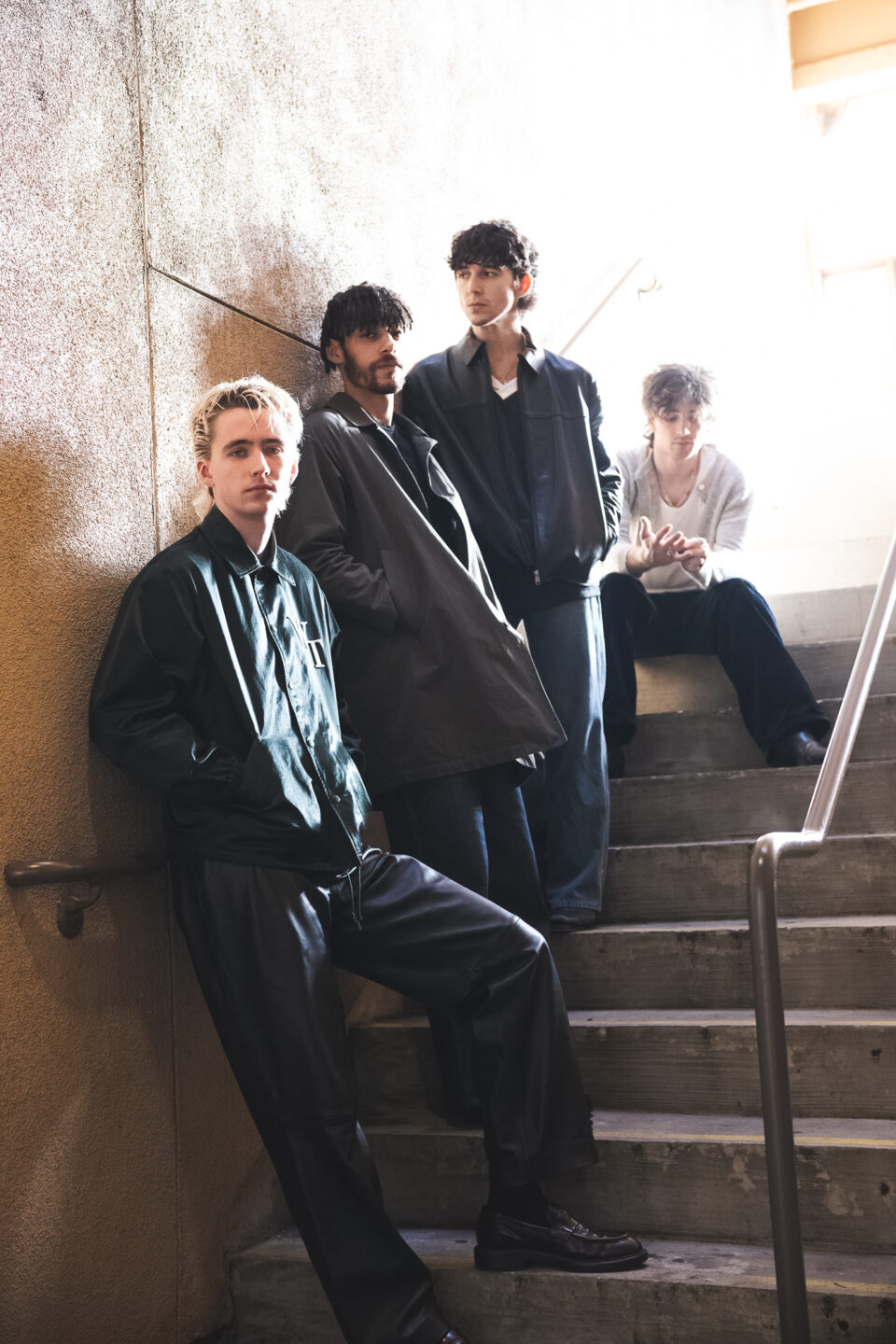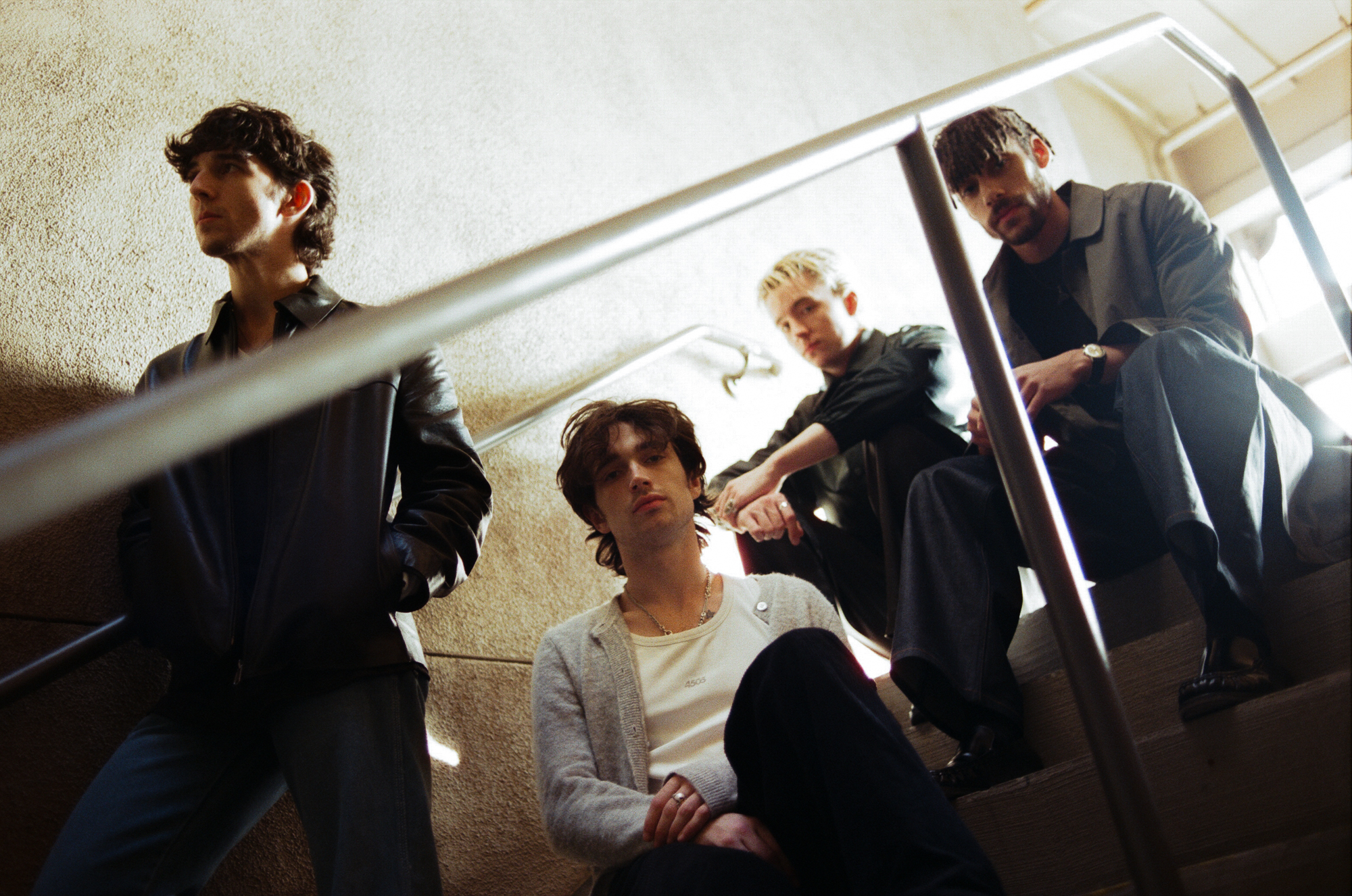Since bursting onto the scene with their debut album It Won’t Always Be Like This in 2021, Ireland’s Inhaler has established a reputation as one of rock’s hottest newcomers. Years of constant touring and a successful sophomore album followed, but in many ways that first album’s title was prophetic. “A big part of this album is trying to find a new perspective on our music,” frontman Eli Hewson says of the quartet’s forthcoming Open Wide. “It felt like we were refining what Inhaler is.” Where they landed is an ambitious and highly eclectic soundscape that references everything from T. Rex to Depeche Mode. In the process, they carve out a niche as purveyors of freewheeling stadium-rock. “The first two albums, we were just a bit trigger-happy,” Hewson says over an afternoon drink at his mate’s pub in Dublin. “This one sounds fuller, but there actually is less information. The songs are just turned up to 10.”
Guiding Inhaler’s metamorphosis on Open Wide from behind the decks is super-producer Kid Harpoon. After two albums with longtime collaborator Antony Genn, they needed to leave the nest. “The main reason we did it was just to see what else we could achieve,” Hewson says between puffs on a rollie. “Ant is like a dad to us, and even he was like, ‘I think you’ve grown up a bit now.’ We just had to go and see what else was possible.” Drummer Ryan McMahon likens the switch to going away to college: “It was a necessary step for not only the four of us, but the five of us,” he says, including Genn. With no hard feelings, the band started hunting for a new producer and landed on Harpoon, with the change proving transformative. “Working with other people forces you to think about what your sound really is,” Hewson says. “You’re forced into thinking, ‘How do we express this to another producer?’”
It’s an even more daunting prospect when the producer in question has won multiple GRAMMYs and has worked with a raft of superstars including Harry Styles, Florence & the Machine, and Miley Cyrus. The answer was to go back to basics. With a break from their touring schedule, the band just jammed. “It was just going back to when we were 17,” Hewson says. “We’d just meet up and play music and write songs.” Being left to their own devices allowed them to experiment and grow, a practice that Kid Harpoon encouraged. “He isn’t the kind of guy who obsesses over chasing that silver bullet of a song,” McMahon says. “We thought he was going to throw in a few catchy choruses or harmonies, but he loved the demos.” In fact, he had only one directive: “He just said, ‘I don’t think you need to change much, but you need to finish the lyrics.”

“The music comes first before anything. Because we feel so confident in the music, it helps us feel less anxious about the reception.” — Eli Hewson



The process of recording the album informed the themes and subject matter—namely, following your gut and trusting your instincts. “We were a bit younger on our first two albums,” Hewson explains. “You’re very impressionable, and things may have gotten away from us.” This time around they backed themselves. “[Kid Harpoon] would just say, ‘Your first approach is the best, you should lean into that.’ So that definitely became the mantra of the album.” Their instincts led them to some very interesting places—as heard on their single “A Question of You,” which finds Inhaler adding a funky groove to the mix. “Obviously we’re inspired by the likes of Nirvana and classic rock bands, but we also love Prince and fucking R&B,” Hewson explains. “That world also really excites us, and I think that with that song we were kind of touching that a little bit.”
Another track that showcases their growth is “Billy (Yeah Yeah Yeah),” which has the band time-traveling to the 1980s. “We all switch our favorite song from week to week with this record, but that one always sticks out,” Hewson says. Keating describes the song as effortless: “It doesn’t sound self-conscious, it’s not afraid to be a pop song—because we love pop music.” If “Billy” is a light and breezy toe-tapper, then a cut like “X-Ray” demonstrates the band’s newfound willingness to experiment. “The demo was bizarre,” Hewson remembers. “It felt like a lost track from Songs of Faith and Devotion.”

While the expectations are understandably high for album number three, Inhaler is determined to take it in their stride. “The music comes first before anything,” Hewson says. “Because we feel so confident in the music, it helps us feel less anxious about the reception.” That said, this is an unashamedly ambitious band hungry for validation. “We don’t feel validated yet,” he continues. “Maybe you just can’t ever feel fully validated as an artist.” McMahon concurs, adding: “I don’t know what our biggest goal is, but if it were to end tomorrow, we could all confidently say we haven’t achieved it yet.”
Another mission awaits the band: bringing rock bands back to the mainstream. “Honestly, being in a band when we were in school was the most uncool thing ever,” Hewson says. Instead, it was all about solo acoustic music. “Everyone was just doing ukuleles, following on that ‘Riptide’ movement,” he adds, referencing Vance Joy’s signature song. “Now, seeing so many great bands out there encourages us to keep getting better.”

McMahon has his own theory on the demise of the rock band: “Music repeats itself every 10 or 15 years, where bands come out and they’re the most important thing in everybody’s lives, and then they go away,” he explains. “And then there’s a period where it’s rap music that takes over people’s lives, and it’s pop stars or boy- or girl-groups or whatever. There’s a cycle of bands constantly going away, but they never go away fully.”
With rock music making a comeback, Inhaler has allowed themselves to dream big. “Wembley would be nice,” Hewson laughs, “but ultimately the goal for us is to make music that we love and be able to connect with people at the same time. We’re ambitious, and playing big gigs is one of the most beautiful experiences.” The ticket to booking those big gigs is releasing big albums, and Inhaler hopes that will take care of itself. “I think the pressure has been lifted, in a sense, but there’s always going to be some sort of pressure that exists. I think we’re only going to allow the pressure to come from the four of us as a collective rather than the expectation of others.”
“I don’t know what our biggest goal is, but if it were to end tomorrow, we could all confidently say we haven’t achieved it yet.” — Ryan McMahon

They plan to work hard while growing—and having fun—as a tight-knit unit. Given their lofty goals and the dedication needed to get there, it’s a good thing that the camaraderie among band members is only growing stronger. “We meet a lot of artists on the road that admit to us that they wish they had it,” Hewson says. “People see us as some sort of X Factor put-together-boy-band thing, which is funny because we’ve been best friends since we were 13, and the thing that binds us is music.” FL








